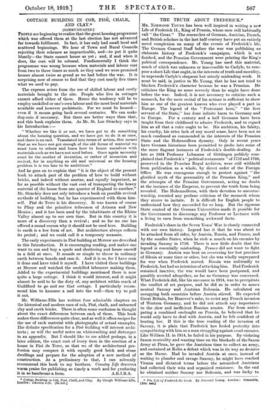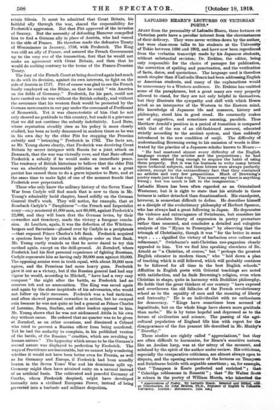THE TRUTH ABOUT FREDERICK.*
Ma. NORWOOD Youxo has been well inspired in writing a new Life of Frederick II., King of Prussia, whom men still habitually call " the Great." The researches of German, Austrian, French, and British scholars in the last half-century have put an entirely
novel complexion on many of the events of Frederick's life. The German General Staff before the war was publishing an
elaborate history of Frederick's campaigns, which is not finished, and the Prussian Government were printing the King's political correspondence. Mr. Young has used this material, much of which was unknown or inaccessible to Carlyle, to compose a short Life that ought, in the interests of truth and morality, to supersede Carlyle's eloquent but utterly misleading work. It must be said, in justice to Mr. Young, that he has not tried to blacken Frederick's character because he was a Prussian. He criticizes the King no more severely than he might have done before the war. Indeed, it is not necessary to criticize such a monarch, for the mere recital of his actions is sufficient to show him as one of the greatest knaves who ever played a part in Europe. The legend of the " Protestant hero," " the first servant of the State," has done infinite harm to Germany and to Europe. For a century and a half Germans have been taught from their childhood to admire Frederick, and to regard him as all that a ruler ought to be. His ambition, his falsity, his cruelty, his utter lack of any moral sense, have been not so much condoned as commended in the interests of the Prussian State and the Hohenzollern dynasty. Only in recent years have German historians been permitted to probe into some of the more flagrant instances of Frederick's double-dealing. As late as 1894 Professor Lehmann of Gottingen publicly complained that Frederick's " political testaments " of 1752 and 1768, preserved in the Prussian Royal archives, were still withheld from publication as a whole, by direct order of the Foreign Office. He was courageous enough to protest against " the glorified myth of the personality of the Prussian King," and the attempts of the Prussian Government, acting no doubt at the instance of the Emperor, to prevent the truth from being revealed. The Hohenzollerns, with their devotion to ancestorworship, resented any profane criticism of the monarch whom they strove to imitate. It is difficult for English people to understand how they succeeded for so long. But the rigorous State control of the German Universities made it possible for the Government to discourage any Professor or Lecturer with a living to earn from unearthing awkward facts.
Frederick's share in the Seven Years' War is closely connected with our own history. Legend has it that he was about to be attacked from all sides, by Austria, Russia, and France, and by the smaller States, when he stole a march on his enemies by invading Saxony in 1756. There is now little doubt that the legend is essentially misleading. France did not want to fight in Germany. Austria was bent on recovering her lost province of Silesia at some time or other, but she was wholly unprepared for war when Frederick moved. Russia was unfriendly to Frederick, but had no intention of attacking him. Had Frederick remained inactive, the war would have been postponed, and possibly averted altogether, so far as Germany was concerned. What Frederick did, like his successor in 1914, was to precipitate the conflict of set purpose, and he did so in order to annex neutral Saxony and Austrian Bohemia. He calculated on occupying both countries before Austria stirred. He expected Great Britain, for Hanover's sake, to resist any French invasion of Western Germany, and he did not attach any importance to the slow and inefficient Russian armies. Far from anticipating a combined onslaught on Prussia, he believed that he would only have to deal with Austria, and he felt confident of beating her. If this is the true reading of the invasion of Saxony, it is plain that Frederick has fooled posterity into sympathizing with him as a man struggling against cruel enemies. Like William II. in 1914, he failed in his purpose. By violating Saxon neutrality and wasting time on the blockade of the Saxon Army at Pima, he gave the Austrians time to collect an army, and sustained at Kolin a defeat which was in its way as decisive as the Manic. Had he invaded Austria at once, instead of waiting to plunder and ravage Saxony, he might have reached Vienna and dictated terms before the astonished Austrians had collected their wits and organized resistance. In the end he obtained neither Saxony nor Bohemia, and was lucky to retain Silesia. It must be admitted that Great Britain, his faithful ally through the war, shared the responsibility for Frederick's aggression. Not that Pitt approved of the invasion of Saxony. But the necessity of defending Hanover compelled him to find a German ally in place of Austria, who had veered to the side of France. He therefore made the defensive Treaty of Westminster in January, 1756, with Frederick. The King was still an ally of France, and assured the French Government up -to the very ever of the transaction, first that he would not make an agreement with Great Britain, and then that he would do nothing contrary to the terms of the Franco-Prussian Treaty.
The fury of the French Court at being dee-eivedagain had much to do with its decision, against its own interests, to fight on the side of Austria in 1757. Pitt of course was glad to see the French busily employed on the Rhine, so that he could " win America on the fields of Germany." Frederick, for his part, could not have carried on the war without the British subsidy, and without the assurance that his western flank would be protected by the German mercenaries in our pay under the command of Ferdinand of Brunswick. Yet it was characteristic of him that he not only showed no gratitude to this country, but made it a grievance that we did not continue the subsidy indefinitely. Lord Bute, whose reputation steadily rises as his policy is more closely studied, has been as hotly denounced in modern times as he was in his own day by the elder Pitt for stopping the Prussian subsidy and " betraying " Frederick in 1762. The facts are, as Mr. Young shows clearly, that Frederick was deceiving Great Britain by secret intrigues with Russia for a joint attack on Denmark, that the war was virtually over, and that Bute offered Frederick a subsidy if he would make an immediate peace. The tendency of British historians to believe that the elder Pitt was an absolutely honourable politician as well as a great patriot has caused them to do a grave injustice to Bute, and at the same time to make light of one of the meanest frauds that Frederick ever perpetrated.
Those who only know the military history of the Seven Years' War from Carlyle will find much that is new to them in Mr. Young's admirably lucid chapter, based solidly on the. German General. Staff's work. They will notice, for example, that at Bomb's& Carlyle's " Dauphiness "—the French and Imperialist army--oniy mustered 41,000 men, not 60,000, against Frederick's 22,000, and they will learn that the German levies, by their • cowardice and treachery, made the victory a foregone conclusion. At Leuthen, again, it was the defection of the Waittembergers and Bavarians--glossed over by Carlyle in a periphrasis —that exposed Prince Charles's left flank. Frederick acquired a spurious fame by his attack in oblique order on that flank. Mr. Young curtly reminds us that he never dared to try this method again, except on the drill-ground. At Zorndorf, where Frederick had his first personal experience of fighting Russians, Carlyle represents him as having only 30,000 men against 50,000. The opposing armies were in truth equal, with about 38,000 men apiece, and the Prussians had more heavy guns. Frederick gave it out as a victory, but if the Russian general had had any vigour he would, according to Mitchell, " have had a. very easy conquest " the night after the battle, as Frederick had no reserves left and no ammunition. The King was saved again and again by the sheer ineptitude of his adversaries, who would not folliaw up their successes. Frederick was a bad tactician, and often showed personal cowardice in action, but he escaped ruin because he was not quite so bad a general as Prince Charles of Lorraine, Daun, Soubise, and other leaders opposed tohim. Mr. Young shows that he was not nicknamed Attila in his own day without cause. He ordered that no quarter was to be given at Zorndorf, as on other occasions, and dismisseda Colonel who tried to prevent a Russian officer from being murdered. Yet he had the audacity to complain, in his published version of the battle, of the Russian " cruelties, which are revolting to human nature." The hypocrisy which seems to be the German's second nature was displayed to perfection by Frederick. The ways of Providence are inscrutable, but we oannot help wondering whether it would not have been better even for Prussia, as well as for Germany and Europe, if Frederick had been soundly beaten in the Seven Years' War and his dominions split up. Germany might then have attained unity on a natural instead of an artificial basis. The cultivated and peaceful Germany of Goethe, whom Frederick despised, might have developed normally into a civilized European Power, instead of being perverted into a barbaric and militant despotism.







































 Previous page
Previous page